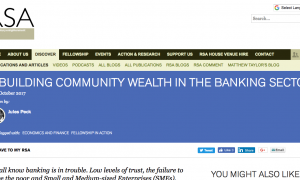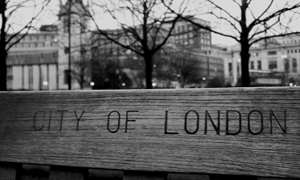
Building Community Wealth in the banking sector
This piece is a blog on the RSA’s website where Jules is a Fellow We all know...
Expert Adviser; Writer; Founding Member of Jericho Chambers

Download Jules' Project Sunlight Pamphlet

We live in a time where the perfect storm of ‘debt-onation’ and peak-money, climate change, flat-lining wellbeing, rising inequality and a host of other issues are concatenating towards what feels like a showdown.
As Stewart Wallis of Nef has put it in talks at Davos 2013, the current economic system is:
“Unstable, unsustainable, unfair and unhappy.”
Or, As Professor Tim Jackson says of our ‘insatiability doctrine’ in his TED talk:
“we spend money we don’t have, on things we don’t need, to make impressions that don’t last, on people we don’t even care about…. .that ecological damage should be the result of a series of consumption practices which clearly fail to increase wellbeing has all the characteristics of a social pathology.”
These are radical times and radical thinking is emerging. Increasing numbers of people from mainstream finance are talking of ‘an end to growth’. Gary Greenberg, Head of emerging markets at Hermes Investment Managers has said:
“We may have to start thinking about a post-growth world”.
Oxford Martin Commission’s Now For the Long Term report talks of rising corporate myopia, institutions, governance, markets, organizations and structures ‘built for yesterday’ and in need of radical updating. Whilst progressives have won many cultural battles, as Professor Paul Campos points out, we have lost the battle for progressive economics.
Intriguingly, WEF’s most recent Global Risks report (fiscal crisis, climate change, severe income disparity, structurally high unemployment etc) mirrors a list of standard critiques of capitalism. In this context we have seen a recent flurry of books on the end or renewal of capitalism, such as “Does Capitalism Have a Future”. Leaders like Unilever CEO Paul Polman regularly call for a new form of capitalism fit for, and serving people and planet.
And legendary fund manager and head of GMO Jeremy Grantham has recently said:
“People simply do not get the point that you can’t have ‘sustainable growth’ forever. You can have sustainability forever, or growth for a few years. Capitalism does millions of things better than the alternatives. However, it is totally ill-equipped to deal with a small handful of issues. Unfortunately, they are the issues that are absolutely central to our long-term wellbeing and even survival.”
Trust in institutions of power such as Government and business is still at all-time lows. And a 2013 Pew Center opinion survey of 39 countries found that only 33% of Americans and 17% of Brits believe their children will live better lives than they had.
But though there is rising consensus that ‘the economic system is broken’, and that one effect of this is that we find ourselves on the precipice of runaway, unstoppable climate chaos, there is little or no progressive consensus on a possible alternative economics to deliver prosperity in a low, or zero carbon world.
Martin Wolf in the FT wrote that our current economics and business model is a system to “privatise profits and socialise risks”. We need to ask what economics might look if we shifted to a system that socialised both the profits and the risks, in which we all shared the good and the bad?
Working with progressive businesses, such as those involved in the B Team, on whose advisory board I sit, I believe a new way is possible. Leading businessmen like Paul Polman of Unilever and Yvon Chouinard of Patagonia are now leading the way in questioning our current economic and commercial models.
With the rise of the post-hierarchical prosumer/aspirational networked generation, new forms of peer-to-peer and collaborative commerce and politics are starting to emerge, which perhaps point the way for business to reframe itself towards ‘purpose’.
Citizen-consumer values are changing fast amid the flourishing of the “Here Comes Everyone” meets “The Wealth Of Networks” wikiworld of the ‘frictionless’ and relationship economy. We are seeing the rise and rise of a digital-democracy powered, peer-to-peer, crowd and matrix of citizen makers and doers. From Airbnb to Blablacar, The Mesh, Openinnovationmeetups and The-people-who-share, these innovations and movements are sending shockwaves through the mainstream. As Kevin Keely, former executive editor of Wired has said “How close to a non-capitalistic, open source peer production society can this movement take us? Closer than we thought.”
In the political realm, with a YouGov poll showing the public supports radical state-imposed control over key sectors and 68% support for nationalising energy companies, Ed Miliband and Stewart Wood are developing their own story about the renewal of markets, economics and ‘Responsible Capitalism’ and key sectors such as energy. And fast-growing peer-to-peer citizen movements like Transition Towns, Occupy, Los Indignados, Buen Vivir, Participative Democracy and online platforms like Partido de la Red, Citivox, Autrespehere and Borgerlyst are also challenging the status quo of the political and market economy and pushing the boundaries.
These tectonic shifts raise some pretty fundamental challenges for business, and especially those involved in updating corporate missions and values. Indeed, Mike Barry, Head of Plan A at M&S says that even the CSR poster-child ‘Plan A’ is mere incrementalism in an age where we need far more radical responses and entirely different markets and business models.
But perhaps, by focusing not on growth and the short term, but by shifting to value wellbeing of people and planet, through strategic innovation processes such as WellbeingNeedfinding, progressive business can develop new business models fit for our times. If the mainstream don’t, you can be sure that social enterprises and disrupters will rewrite the rules and steal their markets.
Copyright 2014 Jules Peck. Jericho Chambers
Leave a Reply